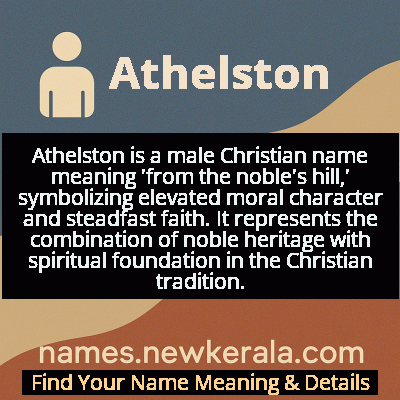Athelston Name Meaning & Details
Origin, Popularity, Numerology Analysis & Name Meaning of Athelston
Discover the origin, meaning, and cultural significance of the name ATHELSTON. Delve into its historical roots and explore the lasting impact it has had on communities and traditions.
Name
Athelston
Gender
Male
Origin
Christian
Lucky Number
6
Meaning of the Name - Athelston
Athelston is a male Christian name meaning 'from the noble's hill,' symbolizing elevated moral character and steadfast faith. It represents the combination of noble heritage with spiritual foundation in the Christian tradition.
Athelston - Complete Numerology Analysis
Your Numerology Number
Based on Pythagorean Numerology System
Ruling Planet
Venus
Positive Nature
Harmonious, responsible, caring, and artistic.
Negative Traits
Overly idealistic, superficial, possessive, or jealous.
Lucky Colours
Pink, turquoise.
Lucky Days
Friday.
Lucky Stones
Diamond, turquoise.
Harmony Numbers
2, 3, 9.
Best Suited Professions
Artists, musicians, teachers, healthcare workers.
What People Like About You
Warmth, nurturing nature, artistic flair.
Famous People Named Athelston
Athelstan of England
King
First King of all England, grandson of Alfred the Great
Athelstan of Hereford
Bishop
Anglo-Saxon bishop known for his religious reforms and scholarship
Athelstan the Half-King
Ealdorman
Powerful Anglo-Saxon noble who served as regent for King Eadred
Name Variations & International Equivalents
Click on blue names to explore their detailed meanings. Gray names with will be available soon.
Cultural & Historical Significance
Throughout medieval England, Athelston remained a name associated with aristocracy and religious leadership, often chosen for sons of noble families who were expected to uphold both secular authority and Christian virtue. The name's persistence in historical records and its appearance in medieval literature demonstrates its enduring appeal as a symbol of righteous leadership and moral integrity within the Christian tradition. Its usage in religious contexts underscores the importance of combining noble character with spiritual devotion.
Extended Personality Analysis
Individuals named Athelston are typically perceived as possessing strong leadership qualities, moral integrity, and a deep sense of responsibility. They often exhibit the noble characteristics suggested by their name's meaning - displaying dignity, honor, and a natural authority that commands respect. These individuals tend to be principled decision-makers who value tradition and stability, often serving as pillars in their communities or families.
Athelstons are frequently described as thoughtful and deliberate in their actions, combining practical wisdom with strong ethical convictions. They may demonstrate a protective nature toward those in their care and show remarkable perseverance in overcoming challenges. While sometimes perceived as reserved or traditional, they typically possess inner strength and resilience that enables them to navigate complex situations with grace and determination, embodying the steadfast qualities of their namesake. Their combination of noble bearing and Christian values often makes them natural leaders who inspire confidence and loyalty in others.
Modern Usage & Popularity
In contemporary times, Athelston remains a rare but meaningful choice, primarily selected by parents seeking a name with historical depth and Christian significance. While not appearing on modern popularity charts, it enjoys niche appeal among families with Anglo-Saxon heritage or those interested in medieval history. The name has seen a slight resurgence in recent years alongside growing interest in traditional and historically significant names, particularly in the United Kingdom and among historical reenactment communities. Its usage reflects a preference for distinctive names that carry substantial cultural and religious weight, often chosen by parents who value the name's connection to early English Christianity and its embodiment of noble virtues.
Symbolic & Spiritual Meanings
Symbolically, Athelston represents the enduring strength of faith and noble character. The 'hill' element suggests elevation, both physically and spiritually, representing moral high ground and the Christian ideal of rising above worldly concerns. The 'noble' component symbolizes not just aristocratic lineage but the Christian concept of nobility through virtuous living and service to others. Together, these elements create a powerful metaphor for spiritual leadership and moral fortitude, embodying the ideal of building one's life upon the solid foundation of faith and ethical principles as taught in Christian tradition.

